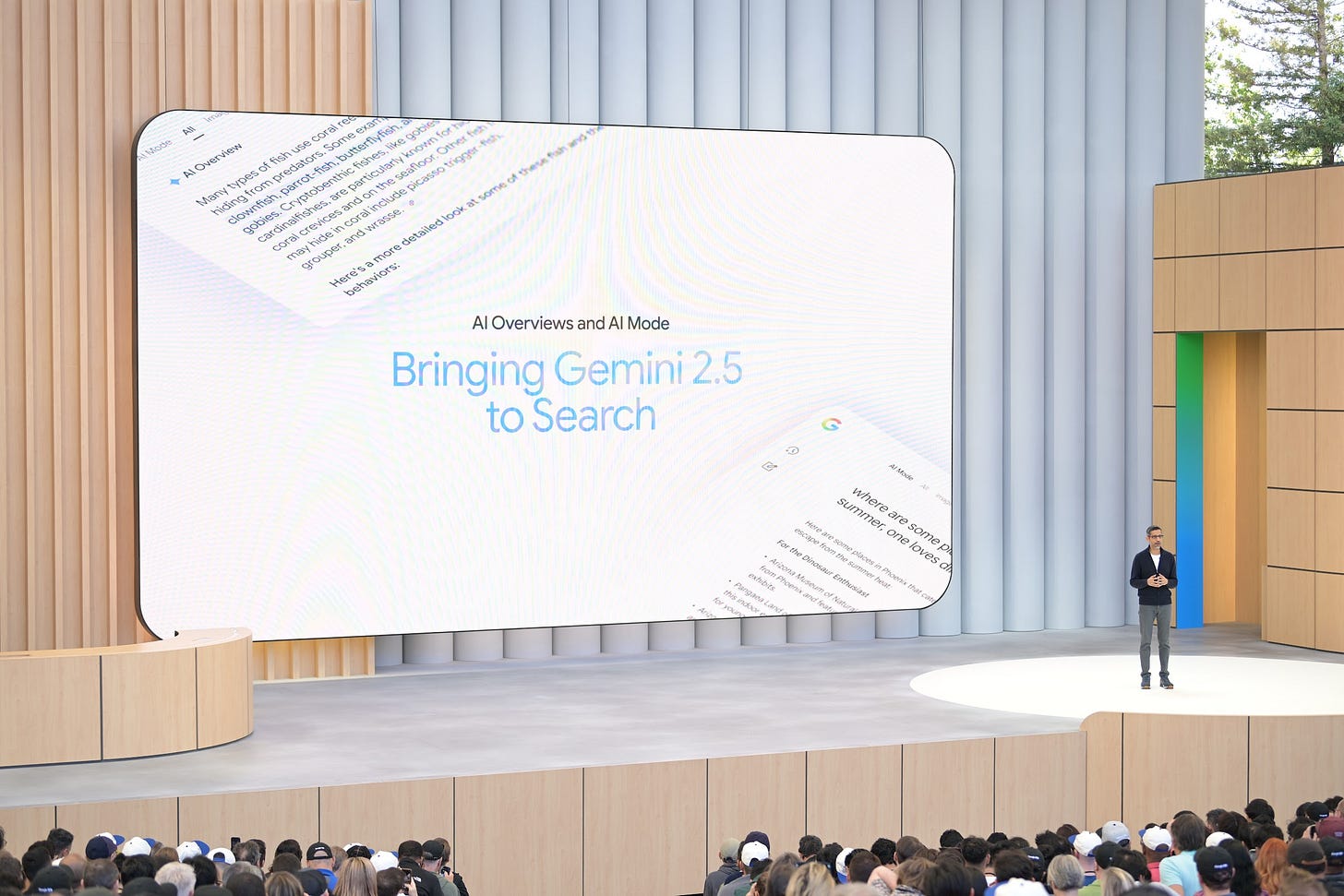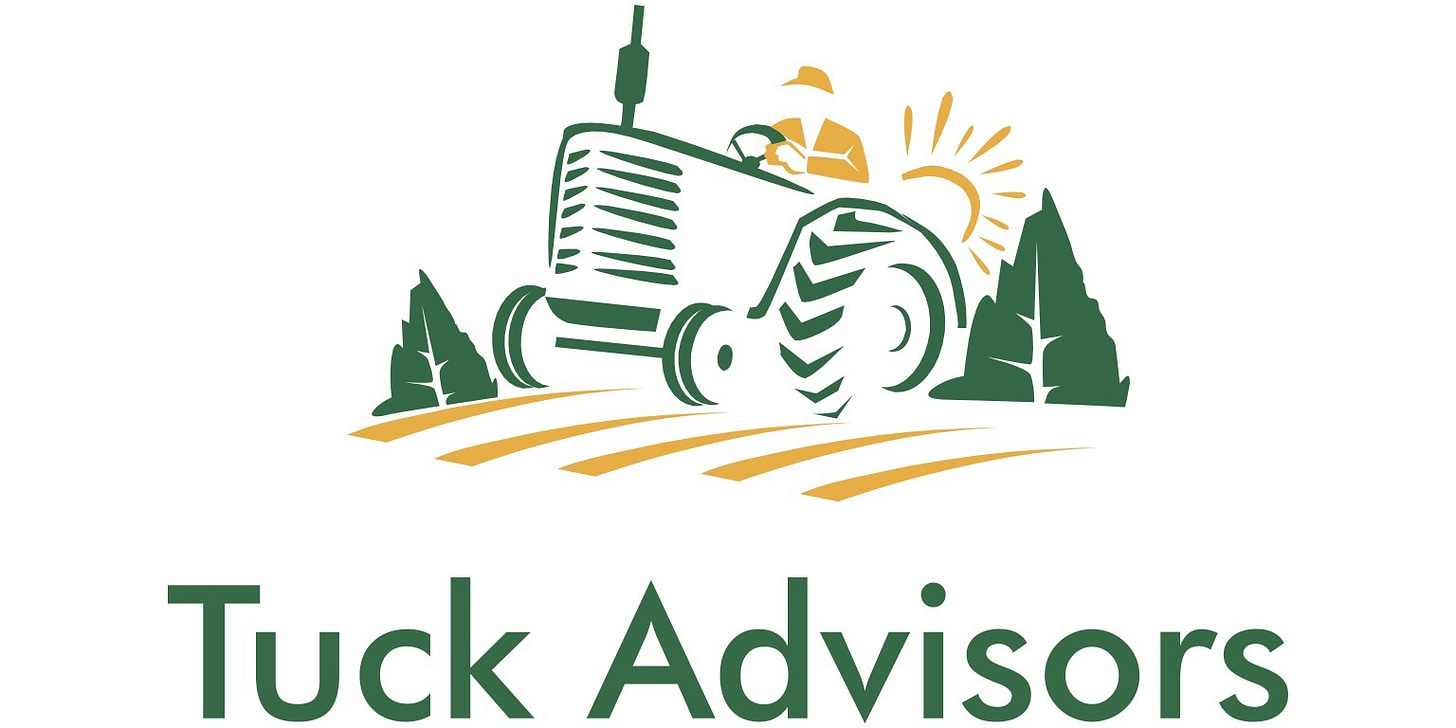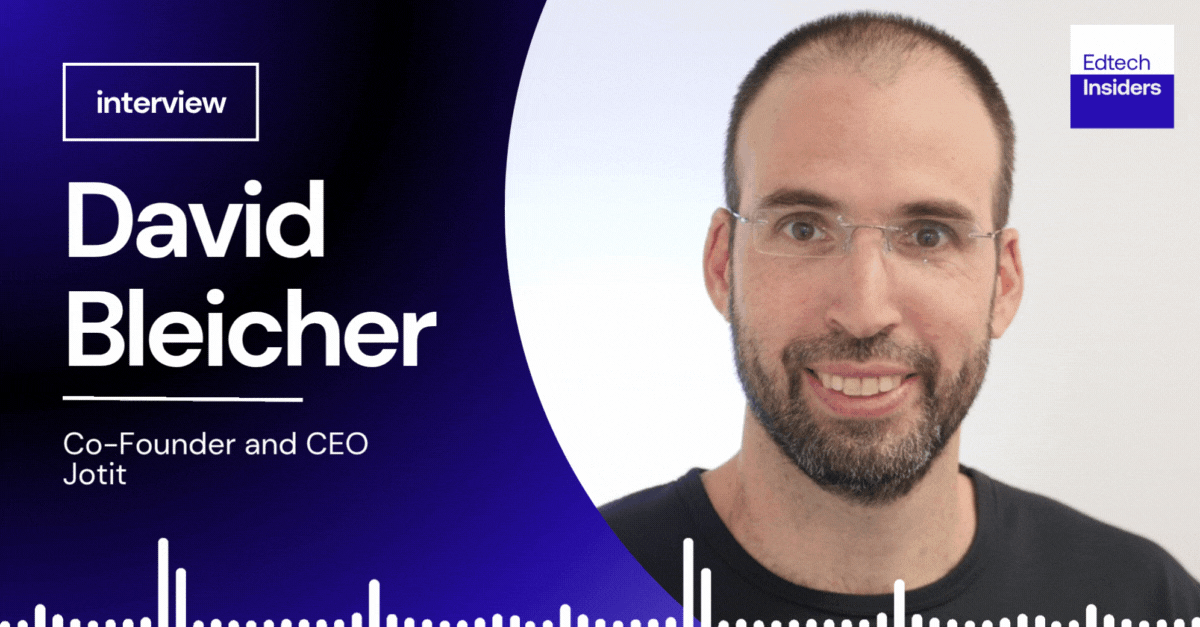10 Google I/O Drops That Matter for Edtech
From Gemini upgrades, to interactive quizzes, to video overviews, here are the top 10 announcements for edtech leaders from Google I/O 2025.
Our members-only WhatsApp group is where the real edtech chatter happens. Subscribe to join!
10 Google I/O Drops That Matter for Edtech
By: Alex Sarlin
Last week was Google I/O 2025, Google's annual conference announcing new updates to the vast Google products suite. As expected, the star of the show was the wide release of AI mode and expanded AI overviews in Google search, arguably the largest change to Google's core business model in the last decade and definitive proof that AI is the heir apparent to web search in terms of finding relevant information quickly.
However, among the 100+ announcements that Google dropped, there are plenty that may have flown under your radar that are highly relevant to work in the edtech industry. Here are 10 core announcements from the Google I/O conference and why they matter for edtech:
Edtech Specific Announcements
LearnLM Incorporated Into Gemini
One of the most exciting and interesting experiments in AI for learning over the last year has been Google's pioneering work to train Gemini on learning and pedagogy to create a family of models called LearnLM. LearnLM had been incorporated into Google's AI Studio back in fall, but it was really exciting to hear that it is now infused directly into Gemini 2.5, Google's core AI model.
It was always notable that Google’s AI guru Demis Hassabis was one of the cited authors on the LearnLM paper. As we like to say on the pod, Google is already the biggest edtech company in the world (see Classroom, Youtube, Chromebooks), despite it being a tiny part of their purview, so their work to lead on learning and education in the AI era is important for the field.
To that end, Google's recent research release is a direct attempt to compare Gemini to other frontier models in terms of its effective use of learning principles. While it should be noted that the methodology here involves educators “role-playing” as students to evaluate how the models teach — which is a bit of a half measure compared to evaluating with real students and real learning outcomes — it's truly encouraging to see Google actively competing for the title of “most pedagogically sound learning model.”
Interactive Quizzing
A product output of the LearnLM work is Gemini's new interactive quiz feature, which allows users to create practice quizzes (and tailored feedback and follow-up quizzes) on any topic with very little prompting. Instructional designers swear by the “testing effect”, in which retrieval practice is known to be one of the most valuable tools for learning so it's very encouraging to see practice quizzes on their radar.
Move Over, Audio Overviews… Here Comes Video!
Google's show stopping “Audio Overview” feature, with which any content can be transformed into a hyper-realistic conversational podcast, has been a runaway success, and was, per the Google AI strategy, recently infused from NotebookLM into the broader Gemini ecosystem.
At I/O, the Google team announced that video overviews are coming, in which users can turn any content into an (educational) video. This is a significant upgrade in terms of accessibility and interest, especially for younger learners, who already see video platforms like YouTube and TikTok as the go-to learning tools.
For now, Google has put out a labs feature called Sparkify, which may be a decent proxy for what these first video overviews might look like. Demos and waiting list here.
And, here is an example video below or at this link.
Project Astra as a Conversational Tutor
Project Astra is the Google AI team’s public research prototype for a “Universal AI Assistant,” and at I/O, Google unveiled a conversational tutor use case, in which Astra can use photo input to identify problems, provide step by step feedback, annotate problems or even generate diagrams. (note: Google bought Edtech AI startup Photomath in 2023).
While this product is still a research prototype, it is a harbinger of things to come in the AI tutoring space.
Gemini Pro Free for College Students
Lastly, it's worth quickly noting that Gemini is joining other frontier model companies in providing free access to Gemini subscription models to college students (in the US, UK, Brazil, Japan, and Indonesia so far).
The clear assumption for model providers is that AI is here to stay as part of the higher education student experience, so they each want to establish themselves as the go-to tool for college students and are willing to take a loss to do so. Secondarily, there may also be a desire to avoid a future in which only well-heeled college students can use AI to support their studies.
For more on the learning features, check out this post by Ben Gomes, Google’s Chief Technologist, Learning & Sustainability, about some of these offerings (and, of course, our Edtech Insiders interview with Ben).
Not Edtech Per Se, But Headlines Important for Edtech
Given Google's ubiquity in the tech landscape, one could make the case that almost any major announcement they make will be relevant to the future of edtech. Here are a few non-education announcements that might be particularly relevant to the edtech field:
Improved Creative Tool Suite
For us at Edtech Insiders, one of the most exciting aspects of the AI Revolution is that it puts incredibly powerful creative tools in the hands of everyday users, including students of all ages. To this end, Google announced upgrades to their image creator, Imagen 4, their music model, Lyria 2, and their video creation model Veo, which now incorporates audio, as well as the release of Flow, a cinematography tool that allows Veo to be used to create cohesive stories and consistent characters with cinematic techniques.
We’re calling it: the next great director, musician, and artists will be teenagers, and we saw that future get one step closer to reality last week. Any arts educator who is not playing with these tools (as well as AI Music app Suno, which just released an exciting model update) is missing out, plain and simple.
SynthID Detector for Identifying AI Generated Content
In our endless excitement about the potential for AI in education, we try to not focus solely on the volume of confusion and panic that AI has rapidly introduced to K12 and college classrooms.
However for front line educators, wrestling with what it means to “AI-proof” assignments and assessments is a daily concern, from verifying authorship, to ensuring integrity, to monitoring students’ sudden ability to create images for bullying and harassment.
The ability to identify AI-generated content is not just a problem for educators: it’s going to be an issue for all of humanity. The “Take it Down” act, banning non-consensual deep fake images was signed into law this week. Google's new SynthID Detector is a step towards empowerment against AI imagery, and we might expect to see some academic integrity offerings over time using the same type of watermark technology.
Improvements in Long-Distance Communication
One of the more intriguing sets of announcements at I/O are about improving the ability to communicate across distance and language barriers.
Google Meet is now incorporating real time translation in which users can communicate in real time across language barriers (can we please call this feature “Babel Fish”?).
Google Beam offers immersive, 3-D communications (e.g., you turn your head, you see the other person from a different angle) in which it truly feels like you're in the same room with someone across the world. And on yeah, by the way, it also provides real-time translation
While these features are currently designed with workspace and enterprise customers in mind, they just might be a turning point in the ability to globalize the online tutoring business, as well as usher in a new era of cross-cultural collaborative learning. Edtech founders, take note!
Search Live Provides Real-Time Feedback on Camera Inputs
Over the last few years, Google has been adding powerful search functionality to its devices and applications with inputs other than text. For example, Google Lens allows users to take a photo and find web results related to it. This functionality is now being extended to video: Google’s Search Live (in AI Mode, incubated within Project Astra) is the newest way to turn real-time photo and video into information.
The learning implications here are truly interesting, both for formal and informal learning. With Search Live, a student can, at least in theory:
Shoot video of a lecturing teacher or professor and get real-time AI assistance about the content
Shoot video of an expert performing a task (e.g., a marine biologist handling an octopus. a cook making a soufflé) and get instructional information about what it is and how to perform it
Shoot video of a real-time process happening in the world (e.g., a spider spinning a web, a 3-D printer making a house) and get real-time information about what is happening and what to know about it
Shoot video of their own processes (e.g., themselves completing a science lab or performing a dance) and get real-time feedback
Per Ben Gomes:
“Learning also takes place in the context of the world around us. So we’re taking a big step in multimodality by bringing Project Astra’s live capabilities into AI Mode with Search Live. Beyond asking questions with text and images, soon you’ll be able to show Search what you see and ask questions about things in the world around you in real-time. Search will provide helpful information with links to explore along the way as you go back-and-forth. Search Live is coming to Labs this summer, perfect for heading back-to-school.”
- Ben Gomes
Google Glasses
In a related note, Google also demonstrated Android XR glasses, their competitive entry to Meta’s Ray-Ban XR glasses and Apple’s Apple Vision Pro. Google’s approach, for now, is to work with multiple device partners (Samsung, Warby Parker, Kering, XReal and Gentle Monster) to create XR glasses fueled by Google AI functionality — but don’t you dare call it Google Glass.
To wit: there is a world in which much of the functionality described above (live contextual AI feedback, real-time translation, step-by-step tutoring, practice quizzes) are built into your face.
Join Edtech Insiders+
If you love Edtech Insiders and want to continue to support our work, consider becoming a paid subscriber! By joining Edtech Insiders+ you receive:
Early access to all Edtech Insiders events. No more sprinting to sign up for our monthly happy hours, edtech summits, and online conferences.
Access to our exclusive WhatsApp channel to connect with the Edtech Insiders community and discuss the latest trends and news in our space.
Access to exclusive member content, including interviews, panels, videos and articles.
All proceeds from subscriptions will help us invest in our podcast, newsletter, events, and community. Our goal is to make Edtech Insiders an enduring and sustainable community offering that connects the edtech ecosystem!
We would be so excited if you decide to join us as a member of Edtech Insiders+.
This edition of the Edtech Insiders Newsletter is sponsored by Tuck Advisors.
Since 2017, Tuck Advisors has been a trusted name in Education M&A. Run by serial entrepreneurs with over 25 years of experience in founding, investing in, and selling companies, we believe you deserve M&A advisors who work as hard as you do. Not all LOIs are the same. In fact they are often apples to oranges to cashews! Use our Deal Value Calculator to level set the real value of your LOI.
Have questions or ready to discuss M&A? Reach out to us.
Edtech Insiders Upcoming Events
Webinar: Co-Design Secrets in Edtech
What does real co-design look like in education technology? Join Edtech Insiders on June 13, 12–1 PM ET for a practical, fast-paced conversation with leaders from Joan Ganz Cooney Center at Sesame Workshop, Leanlab Learning, Playlab AI, and UX of EdTech. Learn how top teams are building better tools with educators and learners—efficiently, inclusively, and at scale.
Cooley LLP is the go-to law firm for edtech innovators, from early childhood through workforce. Informed by decades of experience in the education vertical, Cooley created the first edtech practice to provide industry-informed, business-minded counsel to companies and organizations at all stages of the corporate lifecycle. Cooley provides a multidisciplinary approach to client needs, offering seamless collaboration across offices and practices.
To learn more about what Cooley can do for you, reach out to Naomi May.
Top Edtech Headlines
While Google took the cake for recent headlines, here are a few additional edtech headlines we have our eye on:
1. OpenAI + Jony Ive’s AI Hardware
OpenAI and Jony Ive are collaborating on a screen-free, pocket-sized AI device designed to serve as a "third core device" alongside laptops and smartphones, aiming to integrate AI seamlessly into daily life. This initiative reflects a broader trend toward AI-first devices, offering a glimpse into how such technology could transform education by providing personalized, context-aware learning experiences that move beyond traditional screens.
2. Anthropic Launches “Voice Mode”
Anthropic has introduced a beta version of "voice mode" for its Claude AI chatbot, enabling users to engage in spoken conversations via the mobile app. This feature supports English, offers five distinct voice options, and integrates with Google Workspace for paid subscribers, allowing functionalities like summarizing calendar events and accessing Gmail.
3. AI for Equity Vanguard Fellowship
AI for Equity's Vanguard Fellowship applications are open! This fellowship is an initiative targeting frontline school-based innovators who will cultivate a library of 100+ AI use case demo videos. Applications are open until May 31!
This edition of The Edtech Insiders Newsletter is sponsored by Starbridge.
Too often, outbound sales in EdTech feels like guesswork. Starbridge surfaces early buying signals - meeting minutes, strategic plans, competitor contract expiration dates, and RFPs - to help your team build an accurate, predictable pipeline. See why revenue teams at Collegevine, Amira learning, and Kiddom rely on Starbridge for predictable EdTech growth.
Interview: David Bleicher, Jotit
We have had some amazing guests on The Edtech Insiders Podcast in the last few weeks. One of our stand-out interviews from this past week is with David Bleicher, the Co-Founder and CEO of Jotit.
Here’s a deep dive on our interview with David, and we encourage you to give the full episode a listen for more!
The Origins of Jotit and a Personal Mission
Jotit was born from David Bleicher’s desire to help his son Uri, who struggled with ADHD and dyslexia. Observing Uri’s difficulty in navigating a disorganized mix of digital and physical school materials, David built a prototype tool to streamline his learning process. This tool became the foundation for Jotit, an edtech platform re-centering handwriting in a digital learning environment.
“I didn’t even think it’s gonna be a startup at the first day. But I put myself on a mission to help Uri... All of that was creating like a whole blurry cloud in his mind. And he needed help streamlining this and bringing these two things together into like a clear experience... I’ve never seen such a pull from the market. Everyone I talked to about this product said, ‘Hey, this is amazing.’” - David Bleicher
The Cognitive Power of Handwriting
David emphasizes the deep cognitive benefits of handwriting over typing, referencing both anecdotal experiences and scientific research. Handwriting engages the brain in more dynamic ways, aiding in memory retention, creativity, and comprehension, especially in subjects like math and reading.
“There’s endless [research]... from MRIs looking at the brain and how it activates differently when you handwrite than when you type... Learners at the elementary level who are not learning to handwrite correctly are having trouble learning to read, so their literacy is also compromised... Handwriting is here to stay.”
- David Bleicher
Designing for Multimodal Learning
Jotit allows students to learn using various input methods—handwriting, typing, and voice. This multimodal approach accommodates diverse learning styles and needs, making learning more accessible and inclusive, particularly for students with learning differences or language barriers.
“Instead of trying to tell the educators what to do and the kids what to do, we’re trying to give them the abilities and possibilities... You talked about recording—they can also use recording... It’s being baked into our story and our offering as well.”
- David Bleicher
Empowering Teachers with Simple Yet Powerful Tools
Originally student-focused, Jotit evolved to also serve teachers. Tools like “eyes on me” internet controls, “lockdown mode” for focused work, and real-time classroom engagement features were designed to make digital classrooms more manageable and effective.
“A teacher that stands in front of a digital classroom needs very different tools... [We] understood that this transition is so natural to move from paper to digital paper... The simplicity is kind of our guide when we develop.” -David Bleicher
Strategic Partnerships with Google and Owl Ventures
By choosing not to compete with existing platforms like LMSs or hardware providers, Jotit positioned itself as an enhancer rather than a disruptor. Strategic partnerships with Google and Owl Ventures validate this approach and significantly expand Jotit’s reach and influence in the edtech space.
“A much more mature approach that we took here was to say, hey, we’re gonna connect to any LMS... Google has an incentive to push Jotit forward because Jotit makes so much out of their things... More exciting than any of these [partnership] calls is hearing from a teacher about how they used Jotit to manage a classroom remotely.” - David Bleicher
Curious to Learn More?
You can listen to our full interview with David Bleicher, as well as interviews with many other edtech founders, investors, and thought leaders at The Edtech Insiders Podcast! Check it out, and as always, we’d love to hear what you think!












Looking forward to the co-design event!